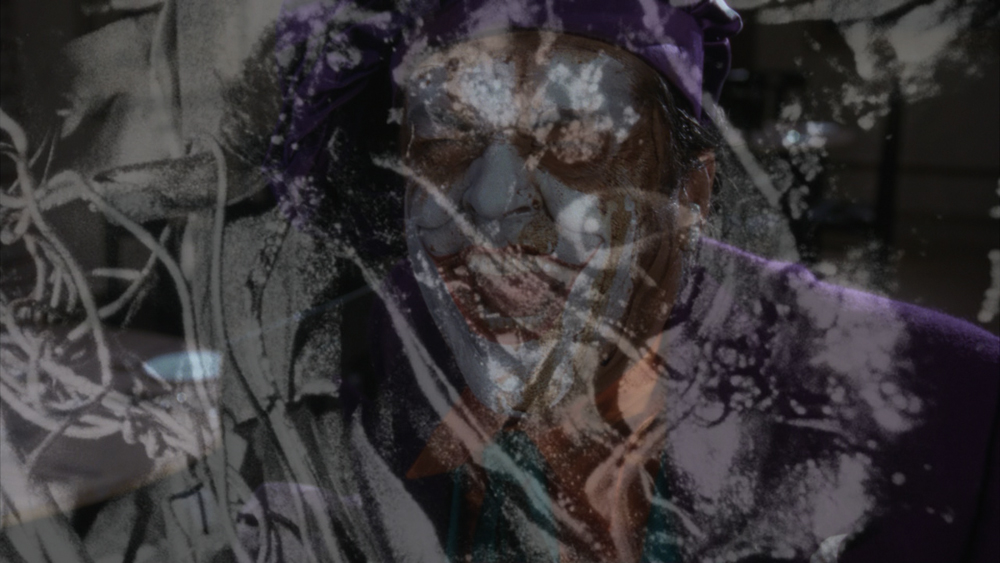
My favorite takeaway from this tournament, aside from How to Get Ahead in Advertising’s surprising-but-welcome Cinderella run, has been that consistently, however dissimilar two movies appear to be on the surface, there are always parallel throughlines to be found. This particular semi-final pairing has made my job a little easier in that regard. In one corner, we have Batman, a cultural juggernaut, the quintessential American blockbuster of its era, and one of only two films in the tournament to have made at least $400 billion, with a “b,” in worldwide gross. In the other corner, Tetsuo: The Iron Man, a audiovisual gut-punch disguised as a cult film, fueled by a very potent blend of frayed nerves and sickly imagination, all shot on eye-searing 16mm for the cost of Batman’s catering budget (this is not an exact figure, but you get the idea). But these are both movies that are shrouded in darkness, expertly poking and prodding at anxieties that develop in cities like germ cultures in Petri dishes. But only one of these movies can claim victory and move onto the finals.
In his second-round essay, collaborator Carl Harris gave the edge to Batman over Road House in part because of the former’s continuing legacy and influence. Whether or not said influence and legacy is a good thing is a whole other discussion for a different series of essays, but it is very easy to draw a straight line from Burton’s contributions to the Bat-Canon to those of Christopher Nolan and even Joel Schumacher (namely Gothic camp, comic-book camp, and macho camp). Batman movies are outsized and ridiculous to varying degrees, and often entertainingly so, but as blockbuster cinema conventions skew more and more towards gray, gritty, and ungainly, there is something positively rousing about the first Burton entry in the cycle. It’s dark, sure, but it’s also funny. It feels expressionistic and theatrical while still like an actual place. It manages to be plotty without being bogged down. Burton, ever the throwback artist, proved to be a natural fit for the material: when you get down to it, Batman movies are basically pulp detective stories where Mike Hammer is cowled and loaded. It’s appropriate, then, that Batman is basically Burton’s Fritz Lang movie, impeccably designed, skewed, paranoid.
Tetsuo: The Iron Man is just as skewed and paranoid in its themes and execution as Batman, though its design is decidedly less impeccable. This is entirely by design: director Shinya Tsukamoto’s eye has a grimy streak a mile wide, and is developed enough even at this early stage of his career to carry a film whose plot is negligible. After all, one of the first images the viewer is confronted with is a man shanking himself in the thigh with a piece of scrap metal, creating a suspiciously vulva-like wound, and then shoving a grooved steel rod into said wound. This is an image that doesn’t need narrative context to be powerful, or at the very least gross. There is an abundance of similar sexual imagery in this film, and not all of it as nuanced as the passage mentioned just prior. Metal sprouts out of things as often as it plunges into others. Every lesion bleeds prodigiously or explosively. The climax of the film literally involves two men melding into a gigantic phallic junkpile. If Batman is about the trauma of crime, then Tetsuo is about the trauma of sex.
But as unsubtle as the film can get, it gets by easily on high-strung, live-wire energy. During an introductory sequence, leading man Tomorowo Taguchi, hair slicked back and wearing a salaryman’s suit, jerks and spasms uncontrollably. It’s like watching a home-made flip book of Robert Longo’s “Men in the Cities” photos, or a singularly perverse re-imagining of the iconic opening sequence of Do the Right Thing, such is the energy it gives off. Tsukamoto busts out every movie in the no-budget playbook: woozy handheld camera, cramped framing, gloppy-but-effective practical effects, rudimentary stop motion. Sets are adored with little more than scrap metal and seemingly-endless tangles of wires. Everything, from a chance encounter on a park bench to adorable little kittens, gets refracted through Tsukamoto’s nightmarish lens, which leads to several instances of grade-A creepy imagery. The salaryman’s kittens, for example, have seemingly contracted the same degenerative disease as their owner, so Tsukamoto puts this across with shots of kittens covered in aluminum foil and wearing tin cans. As described, it sounds slight, but in execution, it’s harrowing, which is a testament to the level of filmmaking on display. Tetsuo, like oft-cited reference point David Lynch, excels at bringing out the nightmarish in the mundane, brought forth here with the help of a dynamic visual style.
Ultimately, this is why I give the edge in this matchup to Tetsuo. Though both of these films are strikingly dark in their own right, Tetsuo is uniquely dark, jarring in its imagery and galvanizing in its execution. It’s cyberpunk as anguished cry, cobbled together from the scrap heaps of post-industrial urban detritus. Gotham City is a hive of moral corruption, sure, but Tetsuo’s city makes that corruption literal, infecting anyone unlucky enough to be close by. There’s a parallel to be drawn here between the metal infection and the Joker’s use of poison gas in Batman, but while the latter is a controlled burst of cartoon chaos doled out for maximum effect, the former plays like a vengeful act of a wrathful god. In Tetsuo, the disintegration of the human body and ultimate loss of self starts off in the red and just gets queasier and more intense from there on out. Plus, from a purely formal point of view, Tetsuo is a classic example creative less-is-more filmmaking. I say this is not to denigrate the amazing creative work of the Batman team, notably the production design staff, because the fruits of their labor are astounding. There is something primal and magical about movies that run on little more than scrappiness and inventiveness, especially when the result is a genre-defining, retina-melting sensorial jolt like Tetsuo: The Iron Man. Give ‘em hell in the finals.
The winner: Tetsuo: The Iron Man
—
Both movies are in print and available online.
Batman; directed by Tim Burton; written by Sam Hamm and Warren Skaaren; starring Michael Keaton, Jack Nicholson, Kim Basinger, Robert Wuhl, Billy Dee Williams, and Michael Gough; 126 minutes
Tetsuo: The Iron Man; written and directed by Shinya Tsukamoto; starring Tomorowo Taguchi, Kei Fujiwara, Nobu Kanaoka, and Shinya Tsukamoto; 67 minutes.



 Derek
Derek
 Isabelle
Isabelle